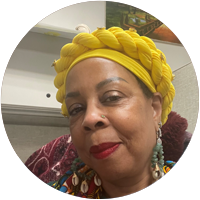Exploring Humanities and Social Sciences Online

Gwendolyn Alexis
CSUF Adjunct Lecturer
Department of African American Studies
Online B.A. in Humanities and Social Sciences
"Even though it's an online class, I stay engaged with my students. I ask questions, send video links, and have discussions in the comments. It’s very personal."
What are the key benefits of taking your class online, and how does it compare to the in-person learning experience?
First, I was an adult student. I got my undergrad in my late 40s, my master's in my 50s, and I retired at 56 because I just wanted to begin a new chapter in my life. I took online classes because I worked, my mother was in the hospital, my aunt was in the hospital, and I had three children. A whole bunch of stuff was going on. Online classes afforded me an education, and that's why it's so important.
I love face-to-face learning, absolutely, but online is really important because not everybody can come to campus. It is a struggle out there. Having both face-to-face and online learning is a perfect balance. I know I wouldn't be here today if it weren’t for online classes.
How does the cohort model contribute to student success in an online learning environment?
Oh, I love the cohort model! Whenever I teach, I am not just the professor—I’m a facilitator. I'm part of the cohort model. You need it because you need support. And when you're in a cohort, you have support from the beginning to graduation.
I wish I had that when I was an undergrad because I felt lonely at times, especially in an online setting. Back then, we didn’t have Discord or other platforms like we do now, so I didn’t always know where to go for help. If I had other students to reach out to, I would have felt like somebody was behind me or beside me. That’s why the cohort model is really important.
""
What key takeaways from your African American studies course can students apply to their academic, professional, or personal lives?
Oh my gosh, I teach so many things! In my African American Music Appreciation course, some students wonder, “What can I get from this class?” But each decade of our lives has music, and music represents what’s happening in society at that time.
We start with African American spirituals—I actually begin in ancient Africa—and then we move through history. We study the blues, jazz, R&B, and more. I even have students write a blues verse, and they make me want to snap my fingers because their writing is so good!
Music is culture. Music is politics. Music is life. It helps us learn about what people were experiencing at different times in history. I can’t think of a time in history when music wasn’t a reflection of what was happening. For example, we discuss Josephine Baker, who faced racism. My students then research what was happening in the 1920s, and we discuss it.
Even though it's an online class, I stay engaged with my students. I ask questions, send video links, and have discussions in the comments. It’s very personal.
What advice would you give to students to succeed in your online class?
Reach out. Contact me. Let me know if you fall behind. Send me a text or an email—I will work with you.
Try to keep up, but I understand that life gets in the way. We don’t plan for things, but unexpected things happen. I was an adult student, and I crashed and burned during my last semester. I took 18 credits, my son was getting married, my mother was sick—it was overwhelming. I notified my professor, and she gave me an incomplete so I could finish later. And I’m here today.
All I ask is that my students let me know if they’re struggling. When I say I understand, I mean it. That’s how you succeed in my class and in other classes—stay on top of assignments and due dates, and reach out if you need help.
You can also watch her interview below:











